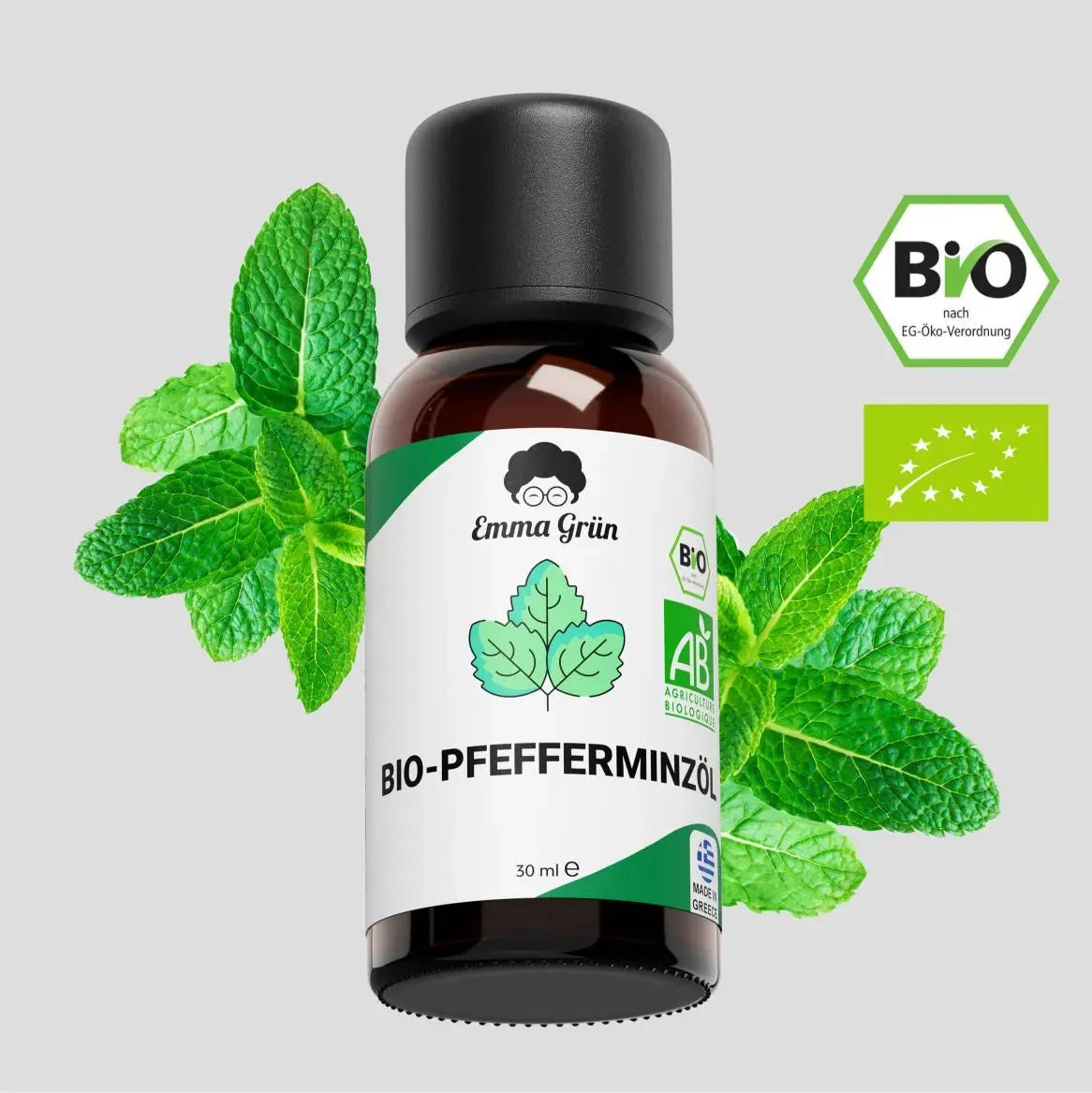Peppermint oil is extracted from the leaves of the peppermint plant and is known for its versatility and refreshing scent. As a natural all-rounder, it has therefore found a firm place in the world of aromatherapy for years and is highly valued as a natural remedy.
In this article, we'll explore the various facets of this remarkable oil, particularly its ability to relieve headaches, whether it's safe to consume, and the overall health benefits it offers. We'll also take a close look at the effectiveness of the ever-popular peppermint tea, which is made from the same aromatic leaves and is known for its calming effects.
So stay tuned and learn more about the wonderful properties of the medicinal herb and how you can significantly improve your well-being with the help of its various applications.
Peppermint oil: relieve headaches naturally
Peppermint oil contains menthol, which has a relaxing effect on muscles and blood vessels . This can help relieve tension in the head and neck area, which often leads to headaches. The cooling effect of menthol can also reduce the sensation of pain. In addition, peppermint oil has anti-inflammatory properties and promotes blood circulation . This can be beneficial for tension headaches and migraines, as these types of disorders are often associated with inflammation and restricted blood circulation.
This is also confirmed by various research results . A study published in the "Deutsches Ärzteblatt" found that inhaling peppermint oil showed significant improvements in headaches. The subjects reported a reduction in headache intensity and faster relief.

Accordingly , peppermint oil is a natural and effective option for headache relief . It relaxes muscles and blood vessels, has anti-inflammatory properties, and promotes blood circulation. Therefore, if you are looking for a natural method for headache relief, peppermint oil is a promising option that you can use without any concerns.
Please note, however, that peppermint oil should always be diluted and used carefully to avoid skin irritation. In addition, if you have persistent or severe headaches, you should always consult a doctor . In some cases, headaches can have other causes that cannot be eliminated with natural remedies.
Peppermint Oil for Oral Use: Safety & Benefits
Taking peppermint oil orally opens up a world of health benefits , with safety in use being paramount.
Peppermint oil taken orally can help with a variety of digestive problems, including irritable bowel syndrome, nausea, and gastrointestinal discomfort. The relaxing properties of peppermint oil can relieve spasms in the digestive tract and help improve overall gut health.
However, caution should be taken when taking peppermint oil . It is important to use only therapeutic, pure oil and to stick to recommended dosages . Peppermint oil should ideally be taken in enteric-coated capsules, which deliver the oil directly to the intestines without irritating the stomach. But what should one be careful of when taking liquid mint oil?
Safety of oral ingestion of peppermint oil
There are a few things to keep in mind when taking peppermint oil orally. The following safety guidelines will ensure safe consumption and prevent side effects :
- Dilution: Peppermint oil should never be taken neat as it is extremely concentrated and can cause mucous membrane irritation. Instead, it should always be diluted with a carrier oil such as olive oil or coconut oil .
- Correct dosage: The recommended dosage can vary from application to application. However , 1-2 drops of peppermint oil in a glass of water are usually enough to enjoy all the benefits of the essential oil. To minimize possible side effects, we recommend that you always start with a lower dosage and increase it slowly.
- Quality: Always choose a high-quality peppermint oil that is suitable for oral consumption . This should not only be communicated on the manufacturer's website. The product should also be labeled accordingly.
Important: Pregnant women, nursing mothers and people with bile duct diseases or severe liver problems should consult their doctor before taking peppermint oil. This also applies to people who are taking medications that could interact with peppermint oil.
Peppermint: Effects on the body
Peppermint is a super herb that is highly prized in both cooking and natural medicine. It offers a wide range of health benefits that invigorate the body and mind. The effects of mint not only include the relief of digestive discomfort and headaches, but also extend to the following areas of health care:
- Digestive support: The medicinal herb is known to relieve symptoms of nausea and irritable bowel syndrome. With regular use, peppermint can even improve overall intestinal health. Its antispasmodic properties also make it a natural remedy for stomach pain and bloating.
- Respiratory health: In addition to the digestive system, peppermint also has beneficial effects on the respiratory system. Inhaling peppermint aromas can help relieve symptoms of nasal congestion, sinusitis or bronchitis. The antiseptic properties of peppermint also help eliminate bacteria and germs in the oral cavity, making it a good choice for oral care.
- Pain relief: Peppermint is also known for its refreshing and invigorating effect. When applied to the skin, peppermint oil is known for its cooling properties, which are particularly helpful for sore muscles or tension and promise quick relief.
- Stress relief: The aroma of peppermint can reduce stress and anxiety. It has a calming effect on the nerves and promotes relaxation.
Because of its wide range of uses and benefits, peppermint is available in many forms, including essential oil, tea, capsules, and in skin care products. However, it is important to follow the correct dosage and usage to achieve the best results and avoid side effects.
Possible applications and dosage
Taking peppermint oil is an effective and natural alternative in the treatment of various health problems. With the right dosage and observing safety precautions, the essential oil is therefore a valuable addition to a healthy lifestyle .
To avoid overdose, we recommend that you follow the manufacturer's instructions. Peppermint oil is generally taken in small doses, as too high a dosage can lead to side effects such as heartburn or skin reactions . The following tips will help you avoid an overdose:
- To relieve digestive problems: take 1-2 drops of peppermint oil in a glass of water before meals.
- For respiratory problems: Peppermint oil can be diluted and used as an inhalation or in a diffuser.
- To increase concentration: A drop of peppermint oil can be applied to the wrists or temples and then rubbed in gently.
Peppermint has a wide range of uses. But what is the best way to use the essential oil?
Different applications of peppermint
The diverse effects of peppermint extend to various areas of application. You can use the medicinal herb for the following purposes:
- Aromatherapy: Peppermint oil is often used in aromatherapy to reduce stress, increase concentration, and improve mood .
- Culinary Uses: Peppermint is used in many culinary recipes, from refreshing teas to desserts and savory dishes.
- Naturopathy: In medicine, peppermint is used to treat digestive problems, respiratory problems and headaches
- Skin care: Peppermint oil can be used in skin care products to relieve itching, cool the skin and reduce pain .
- Oral hygiene: Due to its refreshing and antiseptic properties , peppermint is also a popular ingredient in dental care products.
Overall, peppermint has an impressive range of health benefits and uses, making it an extremely versatile plant. Whether you want to use the medicinal herb for improved digestion, to reduce stress or in the kitchen: peppermint is a valuable addition to your everyday life and increases your well-being.
But what about peppermint tea? Does it have the same effect on the human body as highly concentrated essential mint oil?
Peppermint tea effect: calming and healing
Peppermint tea , an aromatic and soothing infusion, is known worldwide for its calming and healing properties . However, its effects go far beyond a simple refreshing drink and offer numerous health benefits that positively affect both the body and the mind.
- Supports the digestive system: One of the main benefits of peppermint tea is its ability to support the digestive system. It has antispasmodic properties and can provide relief from conditions such as bloating, stomach cramps and indigestion . These properties make it an ideal drink to drink after meals or when you are experiencing digestive discomfort.
- Reduces stress and has a calming effect: Peppermint tea also has a calming effect on the nervous system. It can help reduce stress and anxiety and promotes a relaxed atmosphere, which is especially appreciated in the evening before going to bed. Unlike black or green tea, peppermint tea does not contain caffeine, making it an excellent choice for those looking for a caffeine-free alternative.

- Relieves cold symptoms: In the area of respiratory health, the steam from hot peppermint tea can help open up congested nasal passages and provide relief from cold symptoms. Peppermint's antiseptic and antibacterial properties can also improve oral hygiene and combat bad breath.
Since the production of peppermint oil releases all the ingredients of the leaves, just like brewing peppermint tea, you may be wondering how the tea's effect differs from the way the essential oil works on the human body? The detail is based on the concentration, which requires controlled handling in the case of peppermint oil. The following section explains.
Peppermint tea vs. peppermint oil: The differences
Compared to peppermint oil, which is highly concentrated and used primarily for topical applications or in aromatherapy, peppermint tea offers a milder form of the active ingredients. While the oil is suitable for intensive and targeted use , peppermint tea has a gentler systemic approach that is ideal for daily consumption and general health care. The following properties make the difference:
- Form: Peppermint tea is made by brewing the leaves in hot water, while peppermint oil is an essential oil extracted from the peppermint leaves.
- Application: Peppermint tea is drunk and can be used internally. Peppermint oil is usually applied externally to the skin or used in aromatherapy.
- Concentration: Peppermint tea is less concentrated than peppermint oil and therefore has a milder effect.
Overall , peppermint tea is a delicious beverage with soothing and healing properties , while peppermint oil is usually preferred in aromatherapy and topical applications due to its concentration and uses. However, both have their own unique benefits and can be used as needed.
Buying peppermint oil: What you should pay attention to
To ensure that you purchase a high-quality and effective product, you should consider the following things when purchasing peppermint oil:
- Purity and quality: Make sure the peppermint oil is 100% pure and natural and does not contain any synthetics. Ideally, it should come from a trusted source and have high-quality peppermint leaves as a base.
- Manufacturing process: To ensure that the valuable ingredients are not lost, peppermint oil should be obtained through gentle steam distillation. Cold-pressed oils also retain their therapeutic properties.
- Certifications and labels: Choose essential oils that have organic certifications or other quality labels. Only then can you be sure that the product is free of pesticides and pollutants.
- Packaging: Peppermint oil should be packaged in dark glass bottles to protect it from constant exposure to light. This ensures the quality of the product over a long period of time.
- Brand and origin: Prefer brands with a good reputation that provide their customers with transparent information about the origin and production of their products.
If you want to do something good for yourself and your health and don't want to be the victim of unnecessary experiments due to bad purchases, we recommend that you choose your essential oils carefully. What should you look out for?
- Sustainability: Sustainability and local sourcing can mean, for example, that the peppermint oil is extracted from carefully selected, regionally grown peppermint plants, which helps support local agriculture.
- Organic quality: This means that the oil was grown and processed under strict ecological standards.
- Responsible production: The oil is extracted using environmentally friendly practices , thus maintaining the ecological balance.
Conclusion: Peppermint oil - a true all-rounder
Peppermint oil is much more than just an essential oil with a pleasant scent. It can relieve headaches, increase concentration, nourish the skin, freshen breath and even act as an insect repellent. Its versatile uses make it a must-have in your home.
Whether you use it to improve your health, relax, or care for your skin, peppermint oil can be a valuable addition to your lifestyle.
Frequently Asked Questions (FAQs)
Can peppermint oil be applied undiluted to the skin?
It is recommended to always dilute peppermint oil with a carrier oil, as it can irritate the skin in its pure form.
What is the best way to store peppermint oil?
Peppermint oil should be stored in a sealed, dark container in a cool place to ensure its shelf life.
Are there any contraindications to using peppermint oil?
Pregnant women and people with sensitive skin should consult a doctor before using peppermint oil.
Can peppermint oil also be taken internally?
Yes, but only in food grade. Make sure the oil is suitable for consumption.
Where can you buy high-quality peppermint oil?
High-quality peppermint oil is available in pharmacies, health food stores and online shops.
Sources
- Smith, J. (2020). The Power of Peppermint: 10 Surprising Health Benefits. Healthline.
- National Association for Holistic Aromatherapy. (2021). Peppermint Essential Oil.
- American Psychological Association. (2018). Aromatherapy: Does It Work?
- WebMD. (2022). Peppermint Oil.
- Arndt, J., & Koenig, D. (2019). Influence of peppermint and eucalyptus oil inhalation on athletic performance. Journal of Sport Science, 19(4), 431-437.
- University of Maryland Medical Center. (2019). Peppermint.


